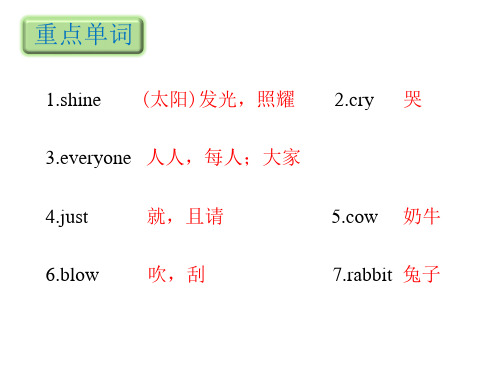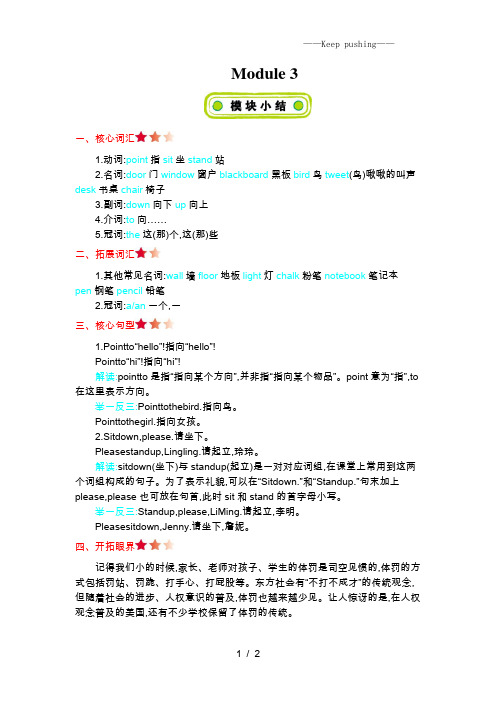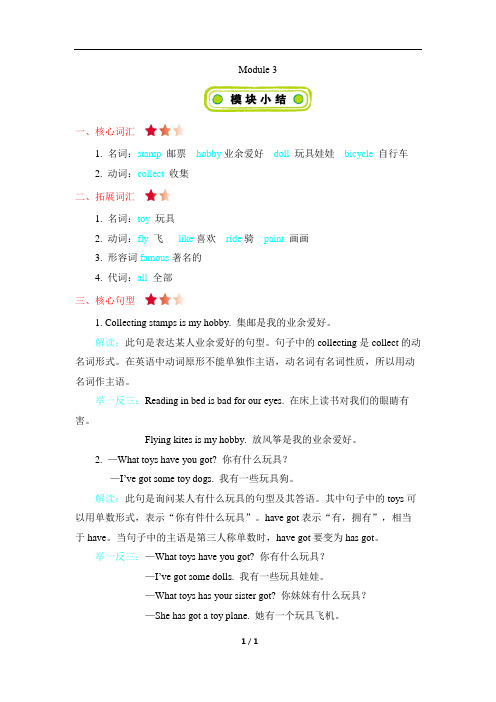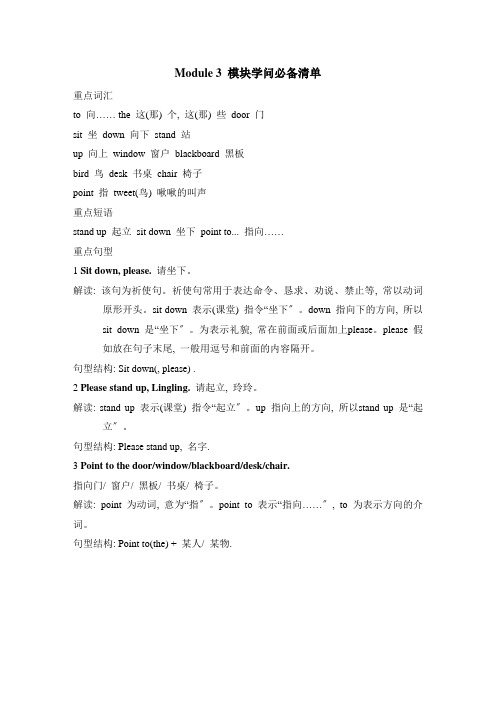英语module3 知识清单
六年级下册英语模块知识清单Module 3 ∣外研社(三起) (共8张PPT)

9.The ducks are swimming on the pond. 鸭子们正在池塘上游泳。
• 9、要学生做的事,教职员躬亲共做;要学生学的知识,教职员躬亲共学;要学生守的规则,教职员躬亲共守。21.8.1321.8.13Friday, August 13, 2021 • 10、阅读一切好书如同和过去最杰出的人谈话。13:57:2013:57:2013:578/13/2021 1:57:20 PM • 11、只有让学生不把全部时间都用在学习上,而留下许多自由支配的时间,他才能顺利地学习……(这)是教育过程的逻辑。21.8.1313:57:2013:57Aug-2113-Aug-21 • 12、要记住,你不仅是教课的教师,也是学生的教育者,生活的导师和道德的引路人。13:57:2013:57:2013:57Friday, August 13, 2021
重点单词
1.shine (太阳)发光,照耀 2.cry 哭
3.everyone 人人,每人;大家
4.just
就,且请
5.cow 奶牛
6.blow 吹,刮
7.rabbit 兔子
重点短语
1.on Saturday 在星期六
2.write to me 给我写信
3.in the tree
在树上
4.fly away
飞走
5.start to rain 开始下雨
6.clean my room 打扫我的房间
7.in the mountains 在山里
8.play hide-and-seek 玩捉迷藏
9. on the train
Module 3基础知识总结

Module 3基础知识总结1、小心(词组)2、v.赢3、n.新闻播报员4、v.报道n.报道5、n.成绩,分数 v.得分6、每个人7、提及8、不客气。
9、v.准备10、v.(进球)得分11、 n.&v.憎恨12、嘘13、向下看(词组)14、v.解释,说明15、声音16、v.看起来,似乎17、要…(词组)18、收听者,听众19、停止播音,关闭(词组)20、adj.每周的 n.周刊21、n.(报纸上的)文章22、麦克风23、玻璃,玻璃杯24、n.声音 v.听起来25、n.&v.检查一、重点词组1.look out (for) sth./sb.小心;留神2.the score of... ……的比分3.take/show sb. around+地点带某人参观……4.Don’t mention it 别客气5.remember to do 记住去干6.remember doing 记得干过7.stop talking 停止说话8.stop to do sth 停下来去干9.keep doing sth. 坚持做某事10.keep sb doing sth. 让某人做某事11.score two goals 进两个球12.decide what to listen to决定听什么13.hate doing sth. 讨厌做某事14.look down at sb. 俯视某人15.sit close to... 坐在……旁边16.the voice of .. ….的声音17.ask for 要….,索取….18.it seems that 好像,似乎19.in person 亲自20.learn about 了解,听说21.Internet radio 网络电台22.talk about 谈论…23.close down 结束播放,24.look out of the window 向窗外看25.once a week 一周一次26.do a/an sound check 做音质测试测试二、重点句子1. We’d like to thank you for taking us around Radio Beijing.感谢您带领我们参观北京电台。
外研社三年级英语上册Module 3 知识清单

Module 3一、核心词汇1.动词:point指sit坐stand站2.名词:door门window窗户blackboard黑板bird鸟tweet(鸟)啾啾的叫声desk书桌chair椅子3.副词:down向下up向上4.介词:to向……5.冠词:the这(那)个,这(那)些二、拓展词汇1.其他常见名词:wall墙floor地板light灯chalk粉笔notebook笔记本pen钢笔pencil铅笔2.冠词:a/an一个,一三、核心句型1.Pointto“hello”!指向“hello”!Pointto“hi”!指向“hi”!解读:pointto是指“指向某个方向”,并非指“指向某个物品”。
point意为“指”,to 在这里表示方向。
举一反三:Pointtothebird.指向鸟。
Pointtothegirl.指向女孩。
2.Sitdown,please.请坐下。
Pleasestandup,Lingling.请起立,玲玲。
解读:sitdown(坐下)与standup(起立)是一对对应词组,在课堂上常用到这两个词组构成的句子。
为了表示礼貌,可以在“Sitdown.”和“Standup.”句末加上please,please也可放在句首,此时sit和stand的首字母小写。
举一反三:Standup,please,LiMing.请起立,李明。
Pleasesitdown,Jenny.请坐下,詹妮。
四、开拓眼界记得我们小的时候,家长、老师对孩子、学生的体罚是司空见惯的,体罚的方式包括罚站、罚跪、打手心、打屁股等。
东方社会有“不打不成才”的传统观念,但随着社会的进步、人权意识的普及,体罚也越来越少见。
让人惊讶的是,在人权观念普及的美国,还有不少学校保留了体罚的传统。
老师有权利体罚学生,这是欧洲移民带到北美的传统,源远流长。
在美国各州中,最早禁止学校体罚的是新泽西州,早在1867年新泽西州就通过法律,全面禁止体罚。
外研版(三起点)小学六年级英语上册Module3_知识清单

Module 3一、核心词汇1. 名词:stamp 邮票hobby业余爱好doll 玩具娃娃bicycle 自行车2. 动词:collect 收集二、拓展词汇1. 名词:toy 玩具2. 动词:fly 飞like喜欢ride骑paint 画画3. 形容词famous著名的4. 代词:all 全部三、核心句型1. Collecting stamps is my hobby. 集邮是我的业余爱好。
解读:此句是表达某人业余爱好的句型。
句子中的collecting是collect的动名词形式。
在英语中动词原形不能单独作主语,动名词有名词性质,所以用动名词作主语。
举一反三:Reading in bed is bad for our eyes. 在床上读书对我们的眼睛有害。
Flying kites is my hobby. 放风筝是我的业余爱好。
2. —What toys have you got? 你有什么玩具?—I’ve got some toy dogs. 我有一些玩具狗。
解读:此句是询问某人有什么玩具的句型及其答语。
其中句子中的toys可以用单数形式,表示“你有件什么玩具”。
have got表示“有,拥有”,相当于have。
当句子中的主语是第三人称单数时,have got要变为has got。
举一反三:—What toys have you got? 你有什么玩具?—I’ve got some dolls. 我有一些玩具娃娃。
—What toys has your sister got? 你妹妹有什么玩具?—She has got a toy plane. 她有一个玩具飞机。
3. —Have you got any stamps from China? 你有来自中国的邮票吗?—Yes, I have. 是的,我有。
解读:此句是由have引导的一般疑问句,用来询问某人是否有什么物品。
句中的have got表示“有”。
外研版(三起)英语五年级英语上册Module 3知识清单

Module 3一、核心词汇1. 名词: weekend周末 place 地方 museum 博物馆 trip 旅行,旅程 river 河,江 hour 小时 minute分钟 wall 墙,城墙 mountain 山 plant植物 British英国人2. 动词: took(take的过去式)搭乘,乘坐(交通工具);需要花费(一定时间) arrive 到达3. 形容词:British 英国的,英国人的 best 最4. 副词:how如何,怎样 along 沿着5. 数词: twenty二十6. 介词:of 关于……的,表明……的 for 达,计 with 拥有,具有二、拓展词汇1. 名词短语:The British Museum大英博物馆 Big Ben 大本钟 the London Eye伦敦眼 The Great Wall 长城2. 方位短语:at the weekend 在周末 in the sea 在海洋里3. 动词短语:see monkeys 看猴子 take photos 照相4. 形容词短语:lots of 许多的5. 表示出行方式的短语:by bus 乘公共汽车 by plane 乘飞机 by train 乘火车三、核心句型1. — What did you do at the weekend?你们在周末做了什么?— We visited lots of places. 我们参观了许多地方.— Where did you go?你们去了哪里?— We went to the British Museum. 我们去了大英博物馆.解读:这两个句子是一般过去时态的特殊疑问句.助动词用“did”, did后跟动词原形;答语中谓语动词用一般过去时态,“visited和 went”就是“visit”和“go”的过去式形式.举一反三:— What did you do yesterday?昨天你做了什么?— I watched TV in the living room. 我在客厅里看电视了.— What did you do last Sunday?你上周日做了什么?— I washed clothes for my mother. 我帮我的妈妈洗衣服了.2. — Did Lingling like the museum?玲玲喜欢这个博物馆吗?— Yes, she did./No, she didn t. 是的,她喜欢./不,她不喜欢.解读:这是一般过去时态的一般疑问句.变成一般疑问句时,把助动词“did”放在句首,后面的动词要用原形.“did”可与各种人称连用,它是do, does 的过去式形式.举一反三:— Did you go to the Great Wall last Sunday?你上周日去长城了吗?— Yes, I did. 是的,我去了.3.— How did you go to these places?你们怎样去的这些地方?— We went by bus. 我们乘公共汽车去的.解读:这是询问过去某个时间出行方式的句型及其答语.助动词用“did”,did后跟动词原形;回答时要指出交通方式.举一反三:— How did you go to school?你怎样去的学校?— I went by bike. 我骑自行车去的.— How did you go to the library?你怎样去的图书馆?— I walked there. 我步行去的那里.四、了解句型1. — What did you do at the weekend?你们在周末做了什么?— We visited lots of places. 我们参观了许多地方.解读:这是一个询问对方过去做过某事的疑问句及其回答.答句中的动词要用它的过去式.2. — Where did you go?你们去了哪里?— We went to the British Museum. 我们去了大英博物馆.解读:这是一个谈论过去到过哪儿的句型及其回答.答句中的动词要用它的过去式.3. — How are you?你好吗?— I m fine, thanks. 我很好,谢谢.解读:这是一个向某人问好的句型及其回答.有两种用法:①用作熟人之间的招呼用语,意为:你好;你好吗?②用来问候健康,意为:你好;你好吗?它的回答有三种,①I m fine, thanks. ②Very well, thanks. ③Fine, thank you.,意思均为“我很好,谢谢.”4. — Did Lingling like the museum?玲玲喜欢这个博物馆吗?— Yes, she did./No, she didn t. 是的,她喜欢./不,她不喜欢.解读:这是一个询问某人是否喜欢某地的一般疑问句及其回答.5. You had a good day!你们度过了美好的一天!解读:这是一个叙述某人度过了美好的一天的句型.6. — Who took this picture?谁拍的这张照片?— Daming did. 大明拍的.解读:这是一个询问是谁做了某事的句型.五、开拓眼界美国人们的日常生活见闻1. 在任何公共场合随处可见席地而坐的人,他们对地板是否干净似乎不需要考虑.2. 厕所里始终有手纸,你不必担心忘带手纸时的尴尬.3. 任何公共场合的门口,都设有为残疾人开门的按钮,只要按按钮,大门随即打开免费.4. 校车是免费的,交规中对它的让行和保护非常严格.5. 图书馆是小孩子的乐园,总有一块领地是属于孩子的,他们可以非常自在地看书,看DVD,上网,甚至嬉戏.6. 一般钓上来的鱼不吃,而是放生.他们吃带刺儿的鱼肉不专业,只好买已经削成薄片的海鱼.7. 住宅几乎都是木制的,混凝土的建筑只有写字楼可见到.8.许多学校的食堂,除了吃饭还是学习的场所,许多学生都带着电脑、书什么的,还有做作业的,而且比较干净.。
Module3模块知识必备清单

Module 3 模块学问必备清单
重点词汇
to 向…… the 这(那) 个, 这(那) 些door 门
sit 坐down 向下stand 站
up 向上window 窗户blackboard 黑板
bird 鸟desk 书桌chair 椅子
point 指tweet(鸟) 啾啾的叫声
重点短语
stand up 起立sit down 坐下point to... 指向……
重点句型
1 Sit down, please. 请坐下。
解读: 该句为祈使句。
祈使句常用于表达命令、恳求、劝说、禁止等, 常以动词原形开头。
sit down 表示(课堂) 指令“坐下〞。
down 指向下的方向, 所以sit down 是“坐下〞。
为表示礼貌, 常在前面或后面加上please。
please 假如放在句子末尾, 一般用逗号和前面的内容隔开。
句型结构: Sit down(, please) .
2 Please stand up, Lingling. 请起立, 玲玲。
解读: stand up 表示(课堂) 指令“起立〞。
up 指向上的方向, 所以stand up 是“起立〞。
句型结构: Please stand up, 名字.
3 Point to the door/window/blackboard/desk/chair.
指向门/ 窗户/ 黑板/ 书桌/ 椅子。
解读: point 为动词, 意为“指〞。
point to 表示“指向……〞, to 为表示方向的介词。
句型结构: Point to(the) + 某人/ 某物.。
外研版五年级英语上册Module 3知识清单
Module3知识清单一、重点单词1.weekend周末2.place地方3.British英国的,英国人的;英国人4.museum博物馆5.how如何,怎样6.best最7.took(take的过去式)搭乘,乘坐(交通工具);需要花费(一定时间)8.trip旅行,旅程9.along沿着10.river河,江11.hour小时12.twenty二十13.minute分钟14.of关于...的,表明...的15.wall墙,城墙16.arrive到达17.for达,计18.mountain山19.with拥有,具有20.plant植物二、重点短语1.at the weekend在周末2.lots of places许多地方3.the British museum大英博物馆4.like...best最喜欢......5.take a boat trip乘船旅游6.along the river沿着河流7.have a good day玩得开心8.walk for an hour走了一个小时9.take a photo/photos of...拍关于...的照片10.the mountains with beautiful flowers有美丽花朵的山三、重点句型1.What did you do at the weekend?你们周末做了什么?2.Where did you go?你们去了哪里?3.How did you go to these places?你们怎么去的这些地方?四、知识点句子结构1:What+did+主语+动原(+其他)?表示某人做过什么事情?如-What did you do at the weekend?你们周末做了什么?-We visited lots of places.我们参观了很多地方。
句子结构2:Where+did+主语+动原?表示某某在哪里做某事?如-Where did you go?-I/We went to....句子结构3:How+did+主语+动原?如-How did you go to Guangyuan?-I/We went by train.五、特殊疑问词的用法特殊疑问句:疑问词引导的疑问句叫做特殊疑问句。
沪教牛津版版三年级上册英语 Module 3 知识清单
Module 3Places and activities一、核心词汇1.室内物品blackboard黑板door门window窗;窗户chair椅子desk书桌bed床2. 动词clean把……擦干净;打扫close关上open打开3. 水果apple苹果banana香蕉orange桔子pear梨4. 文具pen钢笔pencil铅笔schoolbag书包ruler尺book书5. 人称名词dad爸爸mum妈妈6. 形容词late迟到good好的7. 人称代词it它they它们;他们;她们8. 指示代词these这些9. 形容词性物主代词your你的;你们的10. 冠词the(表示特指)a(an)一;一个11. 副词here这里12. 短语look at看how much(用于问价钱)多少13.感叹词please请二、核心句型1. Close the door, please. 请关上门。
解读: 该句型是祈使句,用于表达请求、命令或劝告等。
句型结构:动词原形 + 其他.举一反三: Open the window, please. 请打开窗户。
Read a book, please. 请读本书。
Look at me! 看着我!2. How much is it? 它多少钱?How much are they? 它们多少钱?解读: how much意为“(用于问价钱)多少”。
如果be动词后面的主语是不可数名词或可数名词单数,be动词用is,回答时常用“(It’s + )数词 + 货币单位.”;如果be动词后面的主语是可数名词复数,be动词用are,回答时常用“(They’re + )数词 + 货币单位.”。
若回答是中国的货币单位应采用汉语拼音yuan,fen等,几角常采用几十分来表示,首字母小写,且不用复数。
举一反三: — How much is a book? 一本书多少钱?— Ten , please. 十元。
沪教牛津版四年级英语上册 Module 3 Places and activities 知识点清单
Module 3Places and activities一、核心词汇1.学校设施:school学校office办公室library图书馆;图书室playground操场classroom教室toilet厕所2.食物名词:tomato番茄;西红柿(复数tomatoes)soup汤potato土豆(复数potatoes)carrot胡萝卜fish鱼;鱼肉meat肉rice大米;米饭3.方位介词:in在……里面on在……上面under在……下面beside在……旁边4.形容词:busy忙碌的;繁忙的magic神奇的;有魔力的angry生气的5.名词:computer计算机;电脑animal动物forest森林pupil小学生shop 商店glasses眼镜box盒子;箱子plate盘子;碟子table桌子lunch午餐kitchen厨房floor地板6.动词:try 尝试want 想要give 给need 需要7.其他:many 许多first 第一together 一起where 哪里thirty 三十二、拓展词汇1.学校设施:teachers’ office教师办公室computer room电脑室music room音乐教室art room美术室2.食物名词:beef牛肉chicken鸡肉bread面包noodles面条egg鸡蛋milk牛奶hamburger汉堡包sandwich三明治3.方位名词:behind在……后面near在……附近next to在……旁边above 在……上面at在……三、核心短语computer room电脑室teachers’ office教师办公室 in the forest在森林里climb trees爬树orange juice橙汁make some soup做些汤 a pair of big glasses一副大眼镜 a pair of small glasses一副小眼镜knives and forks刀叉on the table在桌子上in the box在盒子里in her kitchen在她的厨房里on the floor在地板上under the chair在椅子下四、核心句型1.This is the teachers’ office.这是教师办公室。
Module3(知识清单)英语四年级上册
Module 3知识清单一、核心词汇1. 名词: kid 小孩thing东西,物品;事情 people人,人们dragon龙 boat 船 men (man的复数形式)男人 chess 国际象棋 clock 钟2. 动词: see 看到 drink 喝,饮 draw 画jump 跳sing唱歌 dance 跳舞 row 划(船)3. 形容词: interesting有趣的 hungry饥饿的4. 情态动词: can 能够,会5. 介词: between 在……之间,在中间二、拓展词汇1. 副词: gently轻轻地;缓缓地merrily愉快地三、重点短语1.get on(the bus) 上车/get off下车2.lots of interesting things许多有趣的事情3.1ook at看4.in the park在公园do taijiquan打太极拳 6.on the lake在湖上row a dragon boat划龙舟8.between the big trees在大树之间play chess下象棋 10.drink soya milk喝豆浆11.draw pictures 画画四、核心句型1. Let’s go!我们走吧!解读: 此句是let引导的祈使句。
let可引导祈使句,表示建议。
Let’s是let us的缩写形式, let’s指包括听话者在内的“我们”,可翻译成“让我们……吧”。
let us不包括听话者在内。
句型结构: Let + sb + 动词原形 + 其他.2. They’re playing football. 他们正在踢足球。
解读: 此句是描述某人正在做某事的句型。
其中play的用法如下:(1) play后接球类名词时(名词前不加定冠词the),意为“打;踢”。
举一反三: play football踢足球play basketball打篮球(2) play后接乐器名词时(名词前须加定冠词the),意为“弹;拉;演奏”等。
- 1、下载文档前请自行甄别文档内容的完整性,平台不提供额外的编辑、内容补充、找答案等附加服务。
- 2、"仅部分预览"的文档,不可在线预览部分如存在完整性等问题,可反馈申请退款(可完整预览的文档不适用该条件!)。
- 3、如文档侵犯您的权益,请联系客服反馈,我们会尽快为您处理(人工客服工作时间:9:00-18:30)。
MODULE 3 知识清单1. feed v. (_____ _____)(1) feed sb./sth. ____ sth. feed sth.____ sb./sth.给(人或动物)食物,喂养,饲养Their mothers ___________________________. 他们的妈妈们用肉和鱼喂他们。
(2) 靠吃…维持生命,以…为食___________蝴蝶以花园里的花为食。
(3) be fed up withI am fed up with your temper.2. serve v. 请说出下列句子中serve的含义,填空或翻译(1) They served a wonderful meal ___ more than 50 delegates.(2)This dish will serve four hungry people.(3)The attack was unsuccessful and only served only to alert enemy.(4)The sofa will serve ___ a bed for a night or two.(5) He _________________________ for many years. 忠心耿耿伺候这家人3. appetite: n. (1)食欲,胃口。
He suffered from headaches , insomnia and loss of appetite.词组:胃口好__________________ 失去胃口__________________影响食欲________________(2)a strong desire 欲望,此时与介词______ 连用,如:He has no ~ _____ hard work.4. 课本介词用法①There was one boy who was tall ______his age.② Oliver Twist and his companions slowly starved for three months, until finally, they became quite wild ___________ hunger.③The managers of the workhouse were having a meeting when Mr Bumble rushed into the room ___________ great excitement.5. desperate: adj(1)铤而走险的,拼命的,不顾一切的,绝望的~ attempt/ effort/measures(2)非常需要的,渴望be ~ for sth/ to do sth(3)(情况,局势)极危险的,极严重的 a ~ shortage of sth in~ need of翻译:(1)他们面临干净水源的严重短缺。
(2)His increasing financial difficulties forced him to take desperate measures.adv. _____________ the feeling of having all hope绝望地in ________6. He stared in a complete astonishment at the child and held on to the pot for support.✧Hold on to sth/ hold onto sth:(1) He held on to the back of the chair to stop himself.(2) We thought of selling this old furniture, but we’ve decided to ______it. It might be valuable.A. hold on toB. keep up withC. turn toD. look after引申:●hold back ●hold off ●hold on ●hold out ●hold up7. No sooner had the boy spoken these words than the warden hit him on the head with the soup spoon.情分析此句式结构:No sooner ______ ______ sat down _______ the phone rang. 他刚坐下,电话铃就响了。
表示“一.....就”的结构还有:8. hang: (1) 吊死,绞死pt: /pp: ______ ______(2)悬挂,pt/pp: ______ _______☆______ the windows ______ the pictures of different styles.A. Among; hangB. Between; hangedC. Among; hangedD. Between; hang☆The clothes _____ on the hook was of great quality, which caught the attention of the thief.A. hangedB. having hungC. hangingD. being hangedhang的词组:1.hang on2.hang on to sth3.hang up4.hang out5.hang about/around9. Not until at least thirty seconds had passed, _____________________.那个人才能说话。
It was ___________________________ that they made up their mind.他们直到讨论过后才下定决心。
1. convict n. Two of the convicts have escaped from prison.I have all the evidence necessary to convict this young criminal now.He was convicted of fraud.2. Magwitch returns to England illegally, having made a lot of money in Australia.句中having made a lot of money in Australia是______________形式,在句中作_____语,表示make a lot of money的动作在主句谓语动词return动作之前已完成。
3. repay: v.(1)归还,偿还repay sth ___ sb/ repay(sb)( sth )(2) 报答,回报repay sb ____ sth/ repay sth (____ sth )报答某人的好意______________________________adj.应偿还的,应回报的_________ n. _________4. Sadly, Magwitch is caught by the police and dies.sadly是副词,位于句首作_________,修饰___________。
幸运的是破坏很小。
5. guilty adj. (1) I feel really guilty ________ forgetting her birthday again. 羞愧的,内疚的(2)In the 19th century, a person found guilty ___ a crime was called a convict. 有罪的n. 内疚;犯罪__________内疚感_________________6.I intend to …She intended ____________ (catch) the early train, but she didn’t get up in time.Our teacher intended us _______________ (finish) the job today.The film is intended _____ adults only.= The film is meant for adult only.=The company means the film for adult only.1. cast The cast is[are] waiting on the stage.2. distribute(1).分配, 分给(2).散发; 散播; 分布在战争中, 所有的食品都按计划分配。
这些书免费散发。
n.____________3. alikeThe two office buildings are somewhat alike in appearance. 词性:_____The climate here is always hot, summer and winter alike. 词性:_____4. attain v.He attained the position of minister.She attained her ambition of becoming a pilot.6.be of concern to sb ___________________be of no concern to sb ___________________翻译:失业率的上升是政府所关心的大事。
6. 句式欣赏及分析:(1)South of the river lies Southwark , another poor district.(2)In the old City of London are housed the many banks and corporations which Dickens mentions.(3)Further west and opposite Southwark stands Somerset House, where Dicken’s father worked for the navy.(4)Close by are the Law Courts, where lawyers and their clerks, carrying piles of paperwork, would hurry to the trials.以上四句话均为_________句.句式结构的特点为:7. trial: n.(1) He is on trial for murder.She will stand trial for fraud.(2) Children learn to use computers by trial and error.8. home 短语觉得舒适,无拘无束精通_______________________请随意,别拘束________________9. accomplish: v. We have ~ ed all we set out to do._________________ n. C .成绩,成就U.完成,实现10. London is very different today, and few people mourn the passing of the old city. mourn the passing of sth:mourn sb’s death/ lossWe mourn _____ all the people who died in two world wars._________: adj .忧伤的,悲痛的________n. 哀悼,哀痛1.把某人投入监狱____________________2. poverty 短语在贫困之中____________________贫困线_____________________缺乏对农业知识的了解________________________3. attention 短语使某事引起某人的关注使某人关注某事吸引某人的注意某人注意某事。
